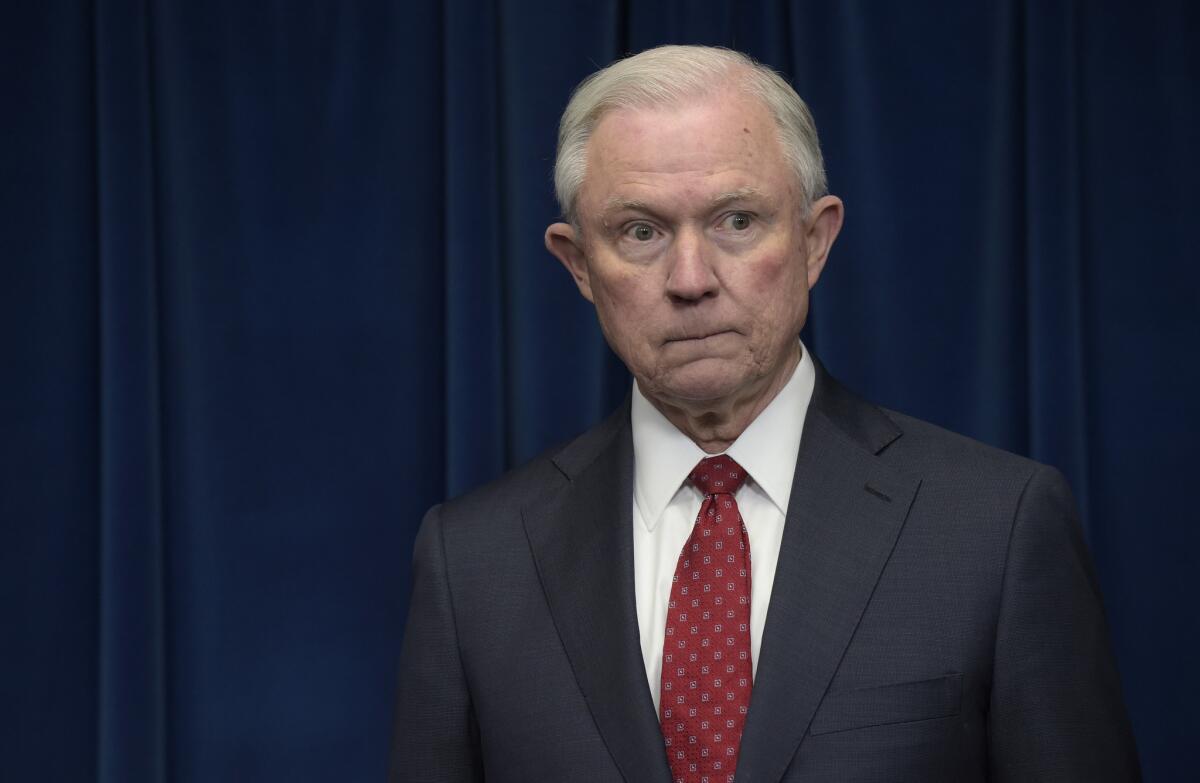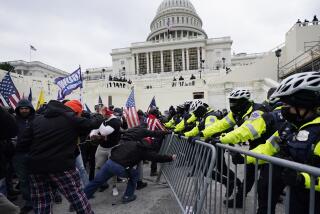Sessions calls any claim he was involved in Russian attempts to influence election a ‘detestable lie’

- Share via
Reporting from Washington — In an often combative defense of his brief tenure as the nation’s top lawman, Atty. Gen. Jeff Sessions on Tuesday forcefully denied any improper contacts with Russian officials and called any suggestion that he aided Russian efforts to influence the 2016 election “an appalling and detestable lie.”
Appearing before the Senate Intelligence Committee, Sessions also vigorously defended his role in the firing of FBI Director James B. Comey last month although he previously had recused himself from the investigation that Comey was leading into Russia’s role in the campaign and any ties with Trump’s aides.
Sessions frequently said he could not remember details of meetings and conversations — and even could not say for certain if he met for a third time with Sergey Kislyak, Russia’s ambassador in Washington, during a Mayflower Hotel reception in April last year. He did not rule out such a meeting but repeatedly said he did not recall it.
“It’s conceivable that that occurred. I just don’t remember it,” he said. Later, however, he slammed reports that he had held some sort of secret side meeting with the Russian as being like “Through the Looking-Glass.”
Alternately angry and deferential in tone, the attorney general offered a staunch defense of his actions for nearly three hours in the latest piece of political theater on Capitol Hill — and just as steadfastly refused to describe his interactions with President Trump other than to say the president’s words and tweets “speak for themselves.”
Sessions thus may have gained more than the White House since his testimony, five days after Comey’s appearance before the same committee, kept the Russia investigation in the spotlight for another day, utterly overshadowing Trump’s trip to Wisconsin to tout his economic record.
The attorney general reminded the lawmakers that he had served alongside many of them for 20 years as a senator from Alabama before he joined the Trump administration.
“Let me state this clearly, colleagues: I have never met with or had any conversation with any Russians or any foreign officials concerning any type of interference with any campaign or election in the United States,” Sessions declared.
“And the suggestion that I participated in any collusion, that I was aware of any collusion with the Russian government to hurt this country, which I have served with honor for 35 years, or to undermine the integrity of our democratic process, is an appalling and detestable lie,” he added in a heated tone.
But Sessions repeatedly refused to reveal anything about his conversations with Trump, frustrating senators who pressed him in vain to say whether the president had mentioned Russia or otherwise explained his reasons for firing Comey on May 9.
“I’m not able … to confirm or deny” any conversations with the president, Sessions said.
Sen. Jack Reed (D-R.I.) noted that Sessions had effusively praised Comey after he had reopened the FBI investigation of Hillary Clinton’s emails 11 days before the election, an event that Democrats said hurt her campaign.
Reed pressed Sessions to explain why he later decided to recommend Comey’s dismissal.
“In retrospect, … I think [Comey’s conduct] was more egregious than I may have even understood at the time,” Sessions responded.
Sen. Martin Heinrich (D-N.M.) at one point accused Sessions of “obstructing” the Senate investigation.
“I am not stonewalling,” Sessions insisted, his voice rising. “I am following the historic policies of the Department of Justice” regarding confidential communications with the White House, he asserted.
Sessions said he had a duty to keep his conversations with Trump private even though the president has not asserted executive privilege – a sensitive claim that could push the administration into a head-on legal and political collision with Congress and the courts.
“He has not asserted executive privilege to date,” the attorney general said, adding that he wanted to preserve the president’s right to assert it later.
Outside experts said they were baffled by Sessions’ refusal to discuss his conversations with Trump.
“Executive privilege clearly exists, but his attempt at asserting it and not asserting it at the same time was bumbling and incoherent,” said Jens David Ohlin, a Cornell Law School professor and expert in international criminal law. “He was all over the map.”
The hearing gave Sessions an opportunity to give his own version of a turbulent month that saw the Justice Department appoint Robert S. Mueller III as special counsel to run the Russia investigation, and Comey’s claim last week that he was “aware of facts” that could make Sessions’ involvement in the Russia inquiry “problematic.”
“What are they?” asked Sen. Ron Wyden (D-Ore.).
“Why don’t you tell me?” Sessions responded sharply. “There are none, Sen. Wyden, I can tell you that for absolute certain. … This is a secret innuendo being leaked out there about me, and I don’t appreciate it.”
Sessions did confirm Comey’s testimony that Trump had met the former FBI director privately in the Oval Office on Feb. 14 after the president had asked everyone else to leave the room.
“I did depart, [and] I believe everyone else did depart,” Sessions testified. The next day, he said, Comey “expressed concern about being left alone with the president,” which is consistent with Comey’s account.
In his testimony last week, Comey said he deliberately avoided telling Sessions about what he felt was pressure from Trump to drop an FBI investigation of Michael Flynn, Trump’s former national security advisor.
Sessions said Comey should have simply told the president he couldn’t talk about an ongoing investigation.
“That’s the way that should work. And apparently it did,” Sessions said, “because he says he did not improperly discuss matters with the president.”
Sessions was an early, enthusiastic backer of Trump’s candidacy, and he became the campaign’s top foreign policy advisor. But Sessions said his team only met a few times and never functioned “as a coherent team.”
As attorney general, Sessions recused himself from the Russia investigation on March 2 following news reports that he had failed to disclose two other meetings with Kislyak during the campaign last year.
On Tuesday, he said that he decided to step aside because of his role as a senior advisor in the Trump campaign, which he said was a potential conflict.
“I basically recused myself … the first day I got into the office,” he said. “I never accessed files, I never learned the names of the investigators, I never met with them, I never asked for any documentation.”
He said, however, that his recusal did not prevent him from urging the president to fire Comey.
“It is absurd, frankly, to suggest that a recusal from a single specific investigation would render the attorney general unable to manage the leadership of the various Department of Justice law enforcement components that conduct thousands of investigations,” Sessions told the senators.
Sen. Kamala Harris (D-Calif.) was one of the most aggressive questioners, pressing Sessions about whether he consulted notes and other records to refresh his memory ahead of his testimony.
Sessions said he had not kept extensive records of his meetings and conversations. The two repeatedly interrupted each other as the freshman lawmaker challenged Sessions to turn over any records from his campaign work to the committee, including his two meetings with Kislyak.
“You’re moving so fast that you don’t keep notes. You meet people. I didn’t keep notes of my conversation with the Russian ambassador at the Republican convention,” he replied.
At one point, Sessions complained that Harris wasn’t giving him time to respond. “I’m not able to be rushed this fast,” he said. “It makes me nervous.”
Sessions’ testimony came as Washington buzzed with speculation about whether Trump was preparing to fire Mueller, the newly appointed special counsel.
“I think he’s weighing that option,” Trump confidant Christopher Ruddy said Monday night in an interview on PBS.
The comment sparked immediate concerns on Capitol Hill that Trump might seek to block the investigation in an echo of President Nixon’s dismissal of a special prosecutor in the notorious “Saturday Night Massacre” of the Watergate scandal.
Deputy Atty. Gen. Rod Rosenstein said at a separate hearing earlier Tuesday that only he has the authority to fire Mueller and that he would not do so without cause — even if the president ordered him to.
“I’m not going to follow any orders unless I believe those are lawful and appropriate orders,” Rosenstein said.
“If there were good cause, I would consider it; if there were not good cause, it wouldn’t matter to me what anybody says.”
Sessions testified that he has “confidence” in Mueller, who preceded Comey as FBI director.
“I don’t know about these reports” that Trump might seek to fire Mueller, he said, adding that he wouldn’t comment on “hypotheticals.”
Twitter: @jtanfani
ALSO
Now it’s Atty. Gen. Jeff Sessions’ turn to testify about the Russia inquiry
Trump may not have the legal power to fire Mueller, the special counsel
Deputy Atty. Gen. Rosenstein: No reason to fire Mueller as special counsel
UPDATES:
4:30 p.m: The story was updated with additional details of Sessions’ testimony.
1 p.m.: The story was updated with additional details of Sessions’ testimony.
12:20 p.m.: The story was updated with additional details of Sessions’ testimony.
12:00 p.m.: The story was updated with Sessions’ initial statements.
11:50 a.m.: The story was updated with the beginning of the hearing.
This story was originally published at 9:50 a.m.
More to Read
Get the L.A. Times Politics newsletter
Deeply reported insights into legislation, politics and policy from Sacramento, Washington and beyond. In your inbox twice per week.
You may occasionally receive promotional content from the Los Angeles Times.













